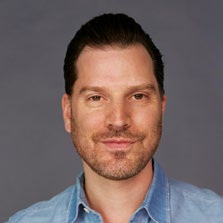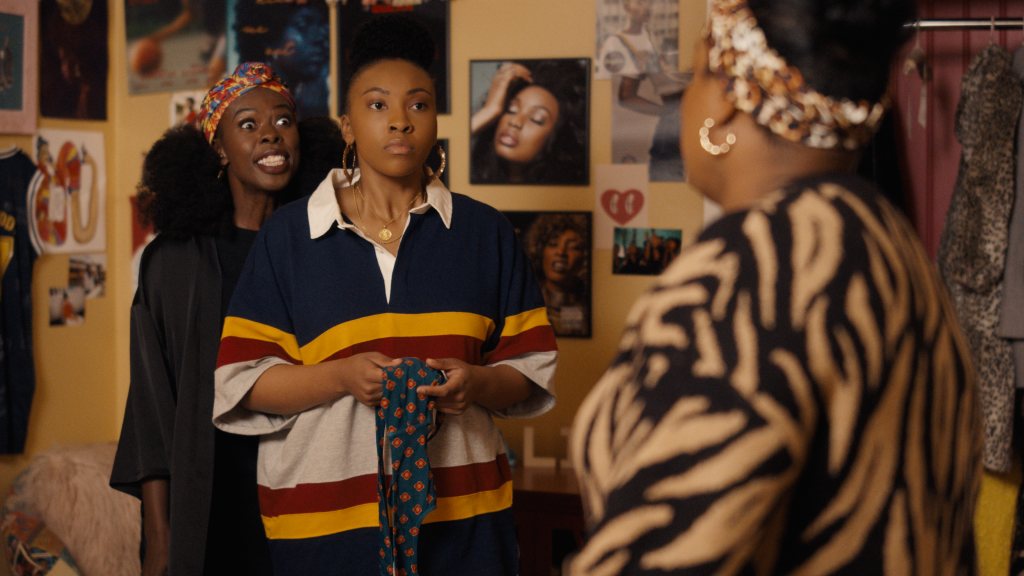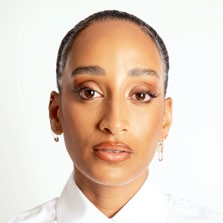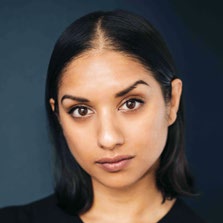Bria Mack gets a show
With a unique premise, fresh voice and potential to reach a wide, often underserved audience, Bria Mack Gets a Life feels like a new chapter in Canadian television. Has New Metric struck gold once again?
Of course, there is no such thing as a CanCon formula. But if there were, this ain’t it.
After graduating university, a 25-year-old Black woman, Bria McFarlane, enters her professional life with optimism and youthful energy, only to find a soul-sucking world that is overwhelmingly white, and complicated by unwritten rules and confusing corporate norms. Complicating matters is her imaginary hype girl, Black Attack, who accompanies Bria everywhere, offering honest, if not always helpful, advice.
Bria Mack Gets a Life, whose first season hits Crave this fall, will make a lot of people laugh.
Very likely, many will see themselves in Bria, the title character. It will also raise a lot of questions, chief among them: Why haven’t we seen anything like this before?
A BRIEF HISTORY OF BRIA

Mark Montefiore (left), founder and CEO of New Metric Media, loves to tell this story. In 2018, he sees a short film of Sasha Leigh Henry’s, Bitches Love Brunch, on the Facebook page of Tania Thompson, Henry’s longtime collaborator. He finds it hilarious, and he reaches out to Thompson, who puts him in touch with Henry. On their first Skype call—this was pre-pandemic, after all—Henry is in Thailand, Thompson is in Japan, and Montefiore is in the UK, and the connection is patchy at best.
“It was choppy, but I was laughing my head off at everything that was making its way through,” says Montefiore. “Sasha was just talking about regular, day-to-day stuff, but I was dying.” He asks Henry if she has any ideas for television, and she walks him through the opening scenes of what would become Bria Mack Gets a Life. Bad connection and all, Montefiore is blown away: “My God, this is brilliant,” he thinks. They decide to develop the idea together.
At the time of her call with Montefiore, Henry had written, directed and produced her share of indie films, but had never worked in television. She didn’t have a series arc planned when she started the development process with New Metric, but she wasn’t daunted. “I’m very much a ‘do what you can with what you have while you can’ type of person,” she says.
New Metric’s interest in Bria Mack shouldn’t be surprising. The company has staked its claim to authentic voice and vision atop beloved niche series like Jared Keeso’s fast-talking small-town sitcom Letterkenny and its amateur-hockey-league spinoff, Shoresy. Like those shows, Bria Mack will air in October as a Crave Original.
“We’re always looking for unique Canadian stories told by underrepresented voices that should be amplified to a mass audience,” says Justin Stockman, VP, Content Development & Programming at Bell Media (Crave’s parent company). “And with the creative force of Sasha Leigh Henry, Bria Mack Gets a Life is a show we knew we needed to get behind.” Everyone who’s come into contact with the show so far seems to feel the same way. What’s it got that everyone wants?
POWERFUL VOICE, PERSISTENT VISION
“She’s got such a quality about her that resonates with anybody” (Montefiore).
“An amazing writer and thinker” (producer Tamar Bird).
“A really extraordinary voice in Canada” (actor Preeti Torul).
“Brilliant” (Thompson).
Everyone on the Bria Mack team is united in their praise for Sasha Leigh Henry, the show’s creator, executive producer, showrunner and co-director. When you hear her speak, you begin to understand why.
She’s laid back but sharp, dishing out industry wisdom and f-bombs in equal measure.
At the time of her first call with New Metric, Bria Mack “was an idea that had been gnawing away in my brain,” says Henry. When she shared that idea with Montefiore, something bigger had a chance to be born—but Henry remains at the helm from start to finish. She gets to do her show her way, which allows for a very distinctive POV to shine through.

Henry’s collaborators call the show “audacious,” “truthful,” “pure gold” and “fucking hilarious.” The show, then, sounds a lot like Henry herself. “Bria is a very good person, just trying to get through life the way she wants to get through life,” explains Thompson, who is an executive producer on the project, “and the world around her wants her to conform. I think that Sasha’s brilliance was knowing that to make your way through life like that is hard. You kind of do need a hype girl or a hype guy.”
“They actually asked us to validate that, and we found that 63 per cent of the women who are currently working in STEM were inspired by her,” confirms Di Nonno.
It’s possible that, as a newcomer to the TV industry, one of Henry’s chief strengths is her Bria-like ability to shut out all the noise about “broadest appeal” and “audience realities,” and resist any pressure to make her show fit someone else’s idea of what her show should look like.
“We need to give audiences more credit,” says Henry, bemoaning the lack of risk taking in Canadian television— and the tendency to view series like Schitt’s Creek and Kim’s Convenience as odds beaters, instead of the standard at which we could be making all shows. “Like, here’s something: why don’t we try it? Especially in comedy: comedy is our jam. Comedy is something in which we have always stood out, especially against the constant juggernaut that is American media.”
ITS OWN HYPE SQUAD
Henry may be its driving force, but Bria Mack is hardly a solo endeavour. The crew is stacked from top to bottom with people who want to see it succeed as much as Henry does—and are filled with the same determined optimism as Bria (and Henry) herself. “To the degree that the show is groundbreaking, which of course we believe it is, it’s not just the content of the show, but it is definitely how the show was made,” says
Thompson. “I just think about how many people of colour were on that crew, how many female crew members were heads of departments, and how pleasant that set was to be on—on a tight budget and under all the constraints of being first-timers, as a lot of people were. It was a spectacularly run show.”
To Thompson’s point, the show was created largely by Black women, from Henry and her co-director Kelly Fyffe Marshall to producers Tamar Bird and Angelique Knights and co-producer Jessica Meya. They’re rightfully proud of this fact.

“This show delivered and showcased brilliant, brilliant people. More so, it showcased brilliant women,” says Bird. “And the world tells us that we can’t come together and lead. I think we crushed that.”
Angelique Knights (right) had done time in marketing and acquisitions at various Canadian networks when she met Montefiore in 2021. Da Kink in My Hair, Global’s Caribbean-Canadian hair-salon sitcom, had resonated with her household when she was growing up—but that was 15 years ago. Knights had a strong sense that the Canadian television landscape was missing valuable voices, particularly Black voices. As a huge fan of Letterkenny, she began to pitch ideas to Montefiore (“If he’s making this show, there’s got to be other shows that he sees the potential in”), and he eventually showed her New Metric’s slate. Bria Mack Gets a Life jumped out immediately, and she was taken on as the show’s creative producer.

Actor Preeti Torul (left), who plays Ami Kennedy, Bria’s best work friend and only coworker of colour, believes the show is important too. She appreciated the chance to play a “human character,” instead of a stereotype or a model minority. “In this industry, I’m always South Asian first. In Bria Mack, my character gets to be flawed and funny, too,” she says.
From the crew to the production company to the broadcast partner (“Bell is an incredible supporter of fearless content, and we knew that they would get it and not try and change the whole thing,” says Montefiore), Bria Mack has an army marching lockstep behind it, intent on bringing Canada something it’s never seen before.
THE UNIVERSAL IN THE PARTICULAR
If Bria Mack soars the way the Bria Mack team believe and hope it will, yes, its success will be thanks to Sasha Leigh Henry’s irresistible POV and a stellar team who was passionate about bringing it into the world. But its success will also be largely due to its ability to reach an audience—Black Canadians between the ages of 25 and 35, particularly women—that has been underserved and basically ignored for far too long.
“Good on New Metric for doing a risky show from the POV of a Black storyteller and through the eyes of a young Black woman in Toronto, which has barely been done in Canadian television,” says Torul. “Even though that shouldn’t be risky.”
It shouldn’t be, and perhaps Bria Mack will prove that it doesn’t need to be. As Knights points out, there are large swaths of Canada’s TV-watching public that rarely, if ever, get to see themselves or their communities on screen. Why should they have to turn to American shows for that?
“Canadians want to see Canadians on screen, especially Black Canadians,” Knights insists.
Of course, having a specific audience in mind needn’t limit the show’s reach. (Does Letterkenny only appeal to hicks, skids and jocks?) As Thompson points out, “Sometimes it’s more fun if you know absolutely nothing about the experience you’re watching. Because then you feel like you’re learning something, or you’ve got a porthole into, for example, mid-thirties women and their sex lives in New York.”
For her part, Henry believes her show has “huge international potential” for two reasons: one, the idea of being “the other” in any space, which “has impact for tons of different marginalized people or people that feel sidelined.” Two, a prominent theme in the show is the tension between the relentless productivity the workplace demands of us and the quality of life we want to enjoy.
“Apparently people in Tanzania are happy, so maybe they’ve figured out a way to do it better,” she jokes. “But it’s something people everywhere else can relate to.”
She may like to make do with what she’s got, but if the show gets renewed after season one, Henry won’t be caught unprepared. “I definitely have ideas for season two, season three, even season four,” she says. But she also recognizes that, in some ways, Bria Mack will have to find her own way, and her own audience, out there in the cruel world.
“Bria Mack will take on its own life as we go, and we’ll see where it goes from there,” she says.
You can bet the show’s hype squad will be cheering it the whole way.